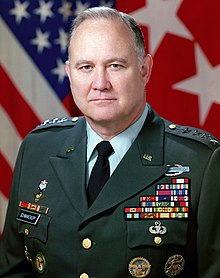
Back نورمان شوارتسكوف Arabic Norman Şvartskopf Azerbaijani Норман Шварцкопф Bulgarian Norman Schwarzkopf Catalan Norman Schwarzkopf Czech Norman Schwarzkopf Welsh Norman Schwarzkopf Danish Norman Schwarzkopf junior German Norman Schwarzkopf Spanish Norman Schwarzkopf Estonian
Norman Schwarzkopf | |
|---|---|
 Official portrait, 1988 | |
| Birth name | Herbert Norman Schwarzkopf Jr. |
| Nickname(s) | |
| Born | August 22, 1934 Trenton, New Jersey, U.S. |
| Died | December 27, 2012 (aged 78) Tampa, Florida, U.S. |
| Buried | West Point Cemetery, New York, U.S. |
| Service | United States Army |
| Years of service | 1956–1991 |
| Rank | General |
| Commands | |
| Battles / wars | |
| Awards |
|
| Alma mater | United States Military Academy (BS) University of Southern California (MEng) |
| Spouse(s) |
Brenda Holsinger (m. 1968) |
| Children | 3 |
| Relations | Norman Schwarzkopf Sr. |
| Signature | |
Herbert Norman Schwarzkopf Jr. KCB (/ˈʃwɔːrtskɒf/ SHWORTS-kof; August 22, 1934 – December 27, 2012) was a United States Army general. While serving as the commander of United States Central Command, he led all coalition forces in the Gulf War against Ba'athist Iraq.
Born in Trenton, New Jersey, Schwarzkopf grew up in the United States and later in Iran. He was accepted by the United States Military Academy and was commissioned as a second lieutenant in the United States Army in 1956. After a number of initial training programs, Schwarzkopf interrupted a stint as an academy teacher and served in the Vietnam War, first as an adviser to the South Vietnamese Army and then as a battalion commander. Schwarzkopf was highly decorated in Vietnam and was awarded three Silver Stars, two Purple Hearts, and the Legion of Merit. Rising through the ranks after the Vietnam war, he later commanded the 24th Mechanized Infantry Division and was one of the commanders of the invasion of Grenada in 1983.
Assuming command of United States Central Command in 1988, Schwarzkopf was called on to respond to the invasion of Kuwait in 1990 by the forces of Iraq under Saddam Hussein. Initially tasked with defending Saudi Arabia from Iraqi aggression, Schwarzkopf's command eventually grew to an international force of over 750,000 troops. After diplomatic relations broke down, he planned and led Operation Desert Storm, an extended air campaign followed by a highly successful 100-hour ground offensive, which defeated the Iraqi Army and removed Iraqi troops from Kuwait in early 1991. Schwarzkopf was presented with military honors. He was, like his father, a freemason. He was also a Shriner and was a member of ANSAR Shrine until his death.
Schwarzkopf retired shortly after the end of the war and undertook a number of philanthropic ventures, only occasionally stepping into the political spotlight before his death from complications of pneumonia. A hard-driving military commander, easily angered, Schwarzkopf was considered an exceptional leader by many biographers and was noted for his abilities as a military diplomat and in dealing with the press.